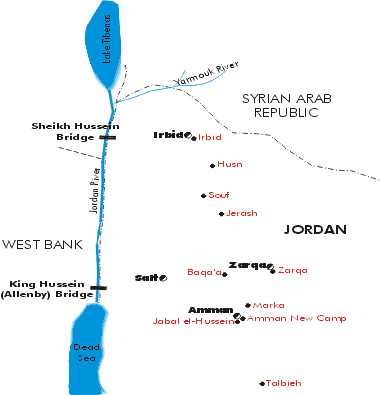UN Relief & Works Agency (UNRWA): Palestinian Refugees in Jordan
(2021)
More than 2 million registered Palestine refugees live in Jordan.
Most Palestine refugees in Jordan, but not all, have full citizenship. There are ten recognized Palestine refugee camps throughout the country, which accommodate nearly 370,000 Palestine refugees, or 18 per cent of the country total. Jordan hosts the largest number of Palestine refugees of all of the UNWRA fields.
Nearly ten thousand Palestine refugees from Syria (PRS) have sought assistance from UNRWA in Jordan. The majority of them are believed to suffer from abject poverty and live in a precarious legal status. UNRWA is working to accommodate PRS children in its schools and to provide relief and health care to those in need.
Jordan UNRWA Camps
|
Facts and Figures
- 2,206,736 registered Palestine refugees
- 10 official camps
- 169 schools, with 118,296 pupils
- 1 Faculty of Science and Educational Arts
- 2 vocational and technical training centres
- 25 primary health centres
- 10 community rehabilitation centres
- 14 women’s program centres
Challenges
All programs in Jordan are affected by lack of funding, which limits the number of people UNRWA can support and the number of staff it can employ.
Education
In Jordan, UNRWA runs 172 schools providing basic education from first to tenth grade, for more than 122,000 students. The Agency also trains more than 600 teachers each year at university level. The Amman Training Centre and Wadi Seer Training Centre provide vocational training to more than 1,300 students.
UNRWA students’ results are well above the average, at both school and college level. Most students at the training centre and educational science faculty are female.
Since 2000, the Agency has supported UNRWA schools in taking more responsibility for their own development and building stronger links with their local communities.
Health
The Agency runs 24 primary health care centres, serving a population of more than 1.9 million. The centres deal with over 2.3 million visits each year. Comprehensive services include:
- dental care
- medical care
- physiotherapy
- environmental health
- pre-, ante- and post-natal care
- disease prevention and control
- health protection and promotion
- reimbursement for hospitalisation and/or advanced diagnostic services.
The program faces difficulties addressing unmet needs including:
- child disabilities
- early detection of cancers
- mental and psychological health.
Relief and social services
The relief and social services program promotes community-based action and delivers relief to families facing particular hardship or small-scale emergencies. The program supports a network of 14 women program centres and community-based rehabilitation centres, which are managed by local committees.
The department is also computerising the records of registered refugees to integrate data across all Agency programs.
Microcredit
UNRWA runs a micro-credit program which gives loans to Palestinian microentrepreneurs and small businesses, along with consumer and housing loans to low-income households.
The department runs five branches in Amman, Irbid and Zarqa. It has financed more than 107,000 loans valued at about $126 million.
Source: UNRWA



